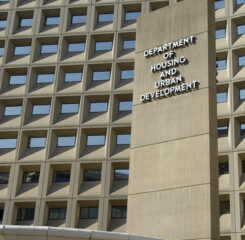Timing of Immigration Bills and an Update on the LeadingAge IMAGINE Initiative
For the first time in years there is new hope that immigration legislation can pass through Congress. President Biden has established immigration reform as a priority, and he has sent a comprehensive bill to Congress to consider.
The President has also given the Secretary of Homeland Security, in consultation with the Secretary of Labor, the authority to increase the number of H-2B temporary immigration visas that allow U.S. employers to fill temporary nonagricultural jobs, when there are not enough U.S. workers who are willing, qualified and able to perform temporary nonagricultural labor. The prospective workers could be employed as short-term personal care aides, home health aides and nursing assistants.
There currently is not a firm time-line on when Congress will consider immigration reform legislation. The House passed two pieces of historic legislation that would grant legal status to undocumented individuals, the American Dream and Promise Act of 2021 (H.R. 6), that gives permanent resident status to long-term residents who entered the U.S. as children. On June 15, the Senate Judiciary Committee held a hearing on H.R. 6. Also, the House passed the Farm Workforce Modernization Act (H.R. 1603), that changes the H-2A temporary worker program for agricultural workers.
In the coming weeks, the House Judiciary Committee will work towards advancing a comprehensive immigration overhaul bill, the U.S. Citizenship Act of 2021 – President Biden’s immigration bill that establishes a new system to responsibly manage and secure our border, manage migration across the hemisphere and modernize our immigration system.
Additionally, there will be efforts to move a bicameral proposal, the Citizenship for Essential Workers Act. LeadingAge supports this proposal that would allow undocumented persons working as essential workers during the COVID-19 pandemic to be eligible for a path to citizenship. The bill proposes that these workers receive permanent resident status. Individuals eligible for the adjustment of status under the legislation include those working in the nonprofit sector, or health care occupations, including home health care and residential care and home and community based services (HCBS). This legislation seeks to provide a “fair, secure, and accessible” pathway to U.S. citizenship for over 5 million immigrant essential workers. Of the 5 million, around 1 million would be defined as “Dreamers” that are holding Deferred Action for Childhood Arrivals (DACA) status. The other 4 million undocumented essential workers largely lack any protection from deportation, meaning a worker could be deemed essential today, but they could be deported tomorrow.
Advocating for IMAGINE Policy Recommendations in Congress. LeadingAge is continuing to elevate “The IMAGINE (International Migration of Aging and Geriatric Workers in Response to the Needs of Elders) Initiative” that was put forward in October 2019. The IMAGINE Initiative offers policy recommendations, pursuable alone or as a package, which make changes to the current immigration laws and allows aging services providers to fill available positions. Shortly after the release of the plan, LeadingAge shared the initiative with members of Congress that had jurisdiction over immigration reform and workforce issues. We also looked for opportunities to amend immigration legislation that were being considered, targeting proposals that addressed “less skilled” workers which typically allow aging services providers to employ direct care workers, including home health aides, certified nursing assistants and personal care aides.
Throughout the COVID-19 pandemic, and during the last session of Congress, LeadingAge continued to advocate for including provisions that would enable aging services organizations to hire foreign-born workers through a range of programs. The House-passed Health and Economic Recovery Omnibus Emergency Solutions (Heroes) Act included provisions that would temporarily ease certain immigration-related restrictions to allow immigrant physicians and other critical healthcare workers to assist in the fight against COVID. Unfortunately, these provisions were not added to the final version of the bill that was enacted into law.
LeadingAge also supported legislation that allowed as many as 40,000 unused immigrant visas to be awarded to nurses and physicians to come to the U.S. during the COVID-19 national emergency, to be included in a COVID-19 relief bill. Congress ultimately did not include these provisions in the proposals that were enacted.
Additionally, LeadingAge will continue to work collaboratively to ask members of Congress to sponsor legislation that creates a new visa category to address our workforce challenges in long-term care, as identified in IMAGINE.

Most Recommended
November 08, 2024
 HOTMA: New Rules for Housing
HOTMA: New Rules for Housing
November 06, 2024
 Colleagues on the Move, November 6, 2024
Colleagues on the Move, November 6, 2024
November 06, 2024
 Analysis: What Does the Final CY2025 Home Health Rule Include?
Analysis: What Does the Final CY2025 Home Health Rule Include?
October 29, 2024
Katie Smith Sloan Urges Members to Build a Movement, Take Action
Recently Added
December 13, 2024
CAST Members in the News
December 13, 2024
a2 Pilot Awards Open for AI-based Healthy Aging Projects
December 13, 2024
HUD Finalizes 30-Day Eviction Notification Rule
December 12, 2024



